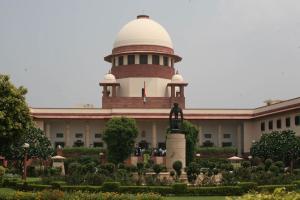The lawsuit should have been filed within three years of the alleged cause of action which arose in 1950 and hence, the 1959 lawsuit of 'Akhara' was time-barred, they said

Supreme Court
New Delhi: The disputed Ram Janmbhoomi-Babri masjid land at Ayodhya "never belonged" to Nirmohi Akhara either under the law on trusteeship or due to its right as 'shebait' (devotee) of deity Ram Lalla, Muslim bodies told Supreme Court on Wednesday. A five-judge Constitution bench headed by Chief Justice Ranjan Gogoi, which heard the land dispute case on the 21st day, was told by senior lawyer Rajeev Dhavan, counsel for Muslim parties, that Akhara cannot overcome the legal hurdle that its 1959 lawsuit to re-claim alleged possession over the site was time-barred under the limitation law.
Akhara, which was granted one-third of the disputed 2.77 acre land by the Allahabad High Court, has said, "The 'Janmsthan' now commonly known as 'Janmabhoomi' belongs and has always belonged to it." The term 'belonging to', as per 'Nirmohi Akhara', extended limitation period to file lawsuit, Dhavan told the bench also comprising justices S A Bobde, D Y Chandrachud, Ashok Bhushan and S A Nazeer. "The answer is that it (land) does not belong to them and 'Akhara' is not the owner of the property either under the English law on trusteeship or as a 'shebait'," said the senior lawyer, appearing for Sunni Waqf Board and others including original litigant M Siddiq.
ADVERTISEMENT
Muslim bodies have said that Akhara filed the lawsuit in 1959, almost nine years after the disputed site was attached by a court-appointed receiver on January 5, 1950 following the alleged placing of idols under the central dome of the building by some miscreant on December 22-23, 1949. The lawsuit should have been filed within three years of the alleged cause of action which arose in 1950 and hence, the 1959 lawsuit of 'Akhara' was time-barred, they said. Dhavan, by referring to several judgements, opposed the submissions of 'Akhara' that its lawsuit was not time-barred as the cause of actions, such as taking over of the possession by the receiver and the denial of right to worship to it, were of the nature of "continuous wrong".
"Let us not interpret continuing wrong and possession in such a manner that they lead to concomitant rights (naturally associated) rights (in favour of Akhara)," Dhavan urged. "What was the continuous wrong which magistrate (who ordered attachment of the site) committed. There was no obligation on the Magistrate to do certain things. The magistrate was following the law. You cannot say that you give it to me," Dhavan said.
The high court judgement has said that one cannot sue the magistrate, he said. "They (Akhara) were never in inner courtyard. How do they come there? They came in 1949 by an illegal act (of placing of idols). Can, they go to the magistrate and say give it to me, you owe me a duty," he said. The bench, which heard the case for almost one-and-half hour after assembling at 2 PM, would commence hearing on Thursday when Dhavan would resume advancing submissions.
The Allahabad High Court, in its judgment of 2010 on four civil lawsuits, had partitioned the 2.77-acre disputed land equally among Sunni Waqf Board, Nirmohi Akhara and Ram Lalla. Fourteen appeals have been filed in the Supreme Court against the verdict.
Catch up on all the latest Crime, National, International and Hatke news here. Also download the new mid-day Android and iOS apps to get latest updates
 Subscribe today by clicking the link and stay updated with the latest news!" Click here!
Subscribe today by clicking the link and stay updated with the latest news!" Click here!







